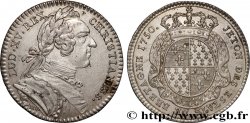Obverse
Obverse legend : LVDOVICVS. MAGNVS. REX..
Obverse description : Sur un piédestal, statue équestre de Louis XIV à droite, cheval au pas ; à l’exergue signature T.B..
Obverse translation : (Louis le Grand roi).
Reverse
Reverse legend : .IETONS. DES. ESTAZ. DE. BRETAGNE. ; À L’EXERGUE : .1693..
Reverse description : Écu couronné écartelé aux 1 et 4 de France, aux 2 et 3 de Bretagne, sur un manteau semé de fleurs de lis et d’hermines.
Commentary
Historical background
BRITTANY (STATES OF...)
Brittany was, of all the French provinces, the one where the monarchy best respected local privileges and particularities.. Its union only dated back to 1532 and its states were the most turbulent in the kingdom.. Their agreement was necessary for any raising of funds and the execution of all the edicts even sovereigns. They were held every two years. The three orders were represented there with bishops, abbots, representatives of the cities and especially many nobles (six to seven hundred) who generally imposed their will on the others, although the vote was done by order.. The nobles and squires formed what was called the "bastion", tyrannizing the rest of the assembly and were especially attracted by parties and meals.. The main resource of the provincial budget was provided by the "duties", very productive tax on drinks but also the fouage or size on the "fire". Despite these revenues, the administration of the States of Brittany was nevertheless expensive and on the eve of the Revolution, the States were in debt of fifty million pounds. The States have produced about 150 different tokens, intended to be offered to members of its administration as a gratuity: 100 for each president, 50 for each auditor, etc.. .










 Report a mistake
Report a mistake Print the page
Print the page Share my selection
Share my selection Ask a question
Ask a question Consign / sell
Consign / sell
 Full data
Full data










